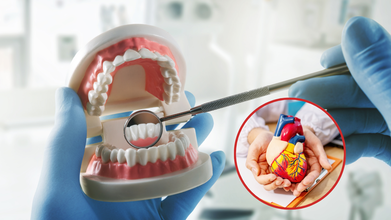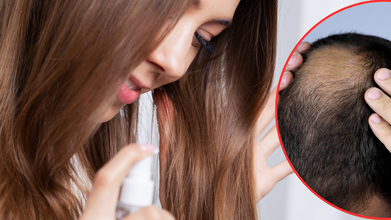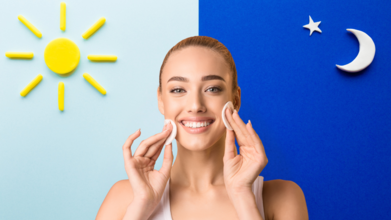- Health Conditions A-Z
- Health & Wellness
- Nutrition
- Fitness
- Health News
- Ayurveda
- Videos
- Medicine A-Z
- Parenting
- Web Stories
Robert F. Kennedy Jr. Says ' I Don’t Think People Should Be Taking Medical Advice From Me'

The US Health Secretary Robert F Kennedy Jr, has been very vocal about his stance on vaccines, causing a stir among citizens who stands unsure of how this will affect the healthcare system. While he has time and again appealed to people with various health claim, including seeking refuge to faith and prayers for drug addiction, recently he said, “I don’t want to seem like I am being evasive, but I don’t think people should be taking medical advice from me.”
During a House committee hearing, RFK Jr. sidestepped direct answers regarding his personal views on childhood vaccinations, despite his history of controversial statements on the topic. Representative Mark Pocan (D-WI) pressed Kennedy on whether he would vaccinate a child against measles.
Initially, Kennedy responded, "Probably for measles," but quickly retreated, stating, "What I would say is my opinions about vaccines are irrelevant." He further emphasized, "I don’t want to seem like I am being evasive, but I don’t think people should be taking medical advice from me," a sentiment he repeated when Pocan continued to press for clarity.
Kennedy's long-standing skepticism towards vaccines, including promoting debunked claims linking them to autism, has drawn significant criticism. His recent assertion that measles vaccines are "leaky" due to waning effectiveness was also disputed by medical experts.
How Have Statements Influenced People?
Though his statement clearly echoes the feelings that what he says regarding health should not be considered seriously, or as a medical advice, it is undeniable that his statements have in fact, influenced many people, making health choices.
As per a new survey by KKF, a nonprofit health information group, only one-third of Republican-leaning parents were aware of the current measles outbreak. This was in comparison with the two-thirds of aware Democratic parents. The survey also found and 1 in 5 Republicans believes that measles vaccine is more dangerous than the diseases itself, this is double the rate of Democrats.
About 35% of Republicans surveyed believe the discredited theory that the MMR vaccine is linked to autism—a belief held by just 10% of Democrats. While belief in this theory has not increased significantly, public awareness of the claim has grown, reflecting the impact of persistent misinformation.
Adding to the confusion is RFK Jr., who has long been associated with anti-vaccine rhetoric. Since taking office, he has supported an investigation into environmental contributors to autism and has floated unproven theories, such as vitamin A being a preventative measure against measles. These statements, while not outright opposing vaccines, muddy public understanding and can discourage immunization.
At a time when clear public health messaging is critical, conflicting remarks from top officials are exacerbating distrust. Advocacy organizations like Immunize.org and The Immunization Partnership warn that such mixed messaging, especially when it originates from high-ranking leaders, undermines public confidence in vaccines.
In southern states like Texas, Louisiana, Arkansas, and Oklahoma, anti-vaccine activism has gained traction within state legislatures. Studies show that even lawmakers with medical backgrounds have not always supported public health measures, often influenced by political considerations and public pressure. Testimony from vaccine opponents at legislative hearings further amplifies misinformation, making it more difficult for facts to gain traction.
The Measles Outbreak And Vaccines
Previously also, the Health Secretary’s actions came under scrutiny again due to the measles outbreak. RFK Jr. has openly endorsed a measles-infected Texas physician who saw children. He had also doubled down on his views of natural immunity, explaining how ‘everyone got measles’ and acquired lifelong immunity.
His previous work with anti-vaccine activists who work with his non-profit group Children’s Health Defense. However, in the speeches following his nomination as the health secretary, he claimed he was never ‘anti-vax’ and has never told the public to avoid vaccinations. This goes against many of his previous statements where he criticized vaccines. In a podcast interview he said “There is no vaccine that is safe and effective” as well as told Fox News his persistent belief in the idea that vaccines cause autism. In Another podcast interview he urged people to resist CDC guidelines, which asked parents to vaccinate their children in view of public health.
Bird Flu and Herd Immunity
During the Bird Flu outbreak, RFK Jr’s suggestions caused an uproar, as suggested to allow bird flu to spread naturally through poultry farms, rather than culling infected birds. This suggestion has drawn sharp criticism from scientists, who warn of potential animal cruelty and heightened public health risks.
Kennedy's plan, outlined in a Fox News interview, involves identifying and preserving naturally immune birds after the virus has run its course. "We can identify the birds and preserve the birds that are immune to it," he stated. While Kennedy lacks direct control over agricultural practices, Agriculture Secretary Brooke Rollins had expressed interest in piloting the idea, suggesting to CBS, "There are some farmers that are out there that are willing to really try this on a pilot as we build the safe perimeter around them to see if there is a way forward with immunity."
However, veterinary experts strongly oppose the proposal, citing significant risks. Dr. Gail Hansen, former state veterinarian for Kansas, told The New York Times, "that's a really terrible idea for any one of a number of reasons.
Can Bad Oral Health Lead To Heart Attacks? Study Reveals Mouth-Cardiovascular Link

(Credit- Canva)
One of the first impressions we make is from a person’s oral hygiene. How clean their teeth look, if they have any mouth odor, how they eat etc. However, did you know, that your mouth health could also make your heart diseases worse? Could they be the actual reason behind what triggered your heart disease?
New research suggests that the health of your mouth might be connected to the health of your heart. A study found that the fatty clogs in our arteries, known as plaques, often contain bacteria. This hints that a slow, ongoing inflammation caused by these bacteria and our body's reaction to them could be a major factor in heart disease.
According to the American Heart Association, the germs from your mouth can affect your heart? The same bacteria that cause tooth decay and gum disease can travel to other parts of your body, including your heart, potentially leading to serious health problems.
What Is The Connection Between Bacteria and Clogged Arteries?
Plaques are a buildup of fatty stuff inside your arteries, and this is a long-term problem caused by inflammation. For a long time, doctors have wondered if infections play a role in this process. While early studies were promising, giving antibiotics to people with heart disease didn't seem to help much.
This new study proposes a different idea: maybe certain bacteria form a protective "biofilm" inside the plaques, where they sit quietly and cause a low-level inflammation. This biofilm might hide the bacteria from our immune system and make them resistant to antibiotics. Over time, this quiet infection could turn a stable plaque into a dangerous one that could rupture and cause a heart attack.
How Does Oral Bacteria Affect Heart Health?
A type of bacteria called viridans streptococci has been found in these plaques. These bacteria normally live in our mouths and are involved in forming dental plaque. They often get into the bloodstream during dental procedures. The study found that:
- Over half of the plaques from the people studied contained bacteria.
- The most common type of bacteria was the one from the mouth, found in about 42% of the samples.
- The presence of these mouth bacteria was directly linked to severe artery problems and death from heart disease.
The research showed that these bacteria weren't just passing through the arteries; they were setting up a little community—a biofilm—inside the plaques. This biofilm acted like a shield, protecting the bacteria from our immune system.
But when a plaque breaks open, which is what causes a heart attack, the bacteria inside the biofilm get out. This triggers a huge immune response that can weaken the plaque's outer layer, leading to a blood clot that blocks blood flow to the heart.
Is This a New Way To Fight Heart Diseases?
The study concludes that these mouth bacteria are not harmless. Instead, a hidden, long-term bacterial infection in the form of a dormant biofilm may be what turns a stable plaque into a dangerous one. This finding highlights how important inflammation is in heart disease and could lead to new ways to diagnose and prevent it in the future.
Could You Reverse Hair Loss And Regrow Bald Spots? New Chemical Agent Could Increase Hair Density by 20%

(Credit- Canva)
Hair is one of the key aspects of a person’s look. A simple haircut can completely change the way you look. So, you can imagine how losing one’s hair can affect them. While it happens to many people, it can completely change the way they view themselves. Although it is a normal part of aging, many men face this challenge from a young age due to many reasons like genetics, male-patterned baldness etc.
While there are ways you can tackle major hair loss like hair transplant, not everyone can afford it. However, a new drug called PP405 might be a game-changer for baldness. Instead of just slowing down hair loss, this new topical drug actually helps "wake up" your hair follicles that have gone to sleep. In early tests, it showed promising results, making hair thicker for some people who used it. If this treatment works in bigger trials, it could be a whole new way to fight baldness.
How the New Hair Growth Drug Works?
The new drug, PP405, is a topical cream that you apply to the scalp. It's different from older treatments because it doesn't just try to slow down hair loss. Instead, it works by waking up the hair follicles that have become dormant, or "asleep." Scientists found that in many people with hair loss, the stem cells in their hair follicles aren't dead—they've just stopped working. This new drug specifically targets these dormant cells to get them growing hair again.
In an early study, led by dermatologist Qing Yu Christina Weng, MD, chief medical officer of Pelage Pharmaceuticals, the results were very promising: some patients saw their hair become more than 20% thicker. The new hair wasn't just thin, "baby hair"; it was thick, mature hair. A key safety feature is that the drug is designed to get into the skin where it's needed without being absorbed into the rest of the body.
Can You Regrow Hair With Medicine?
Dermatologists are excited about the new drug's potential because it offers a completely new way to treat hair loss. However, they are also being cautious. The study so far was small and short, and the results haven't been fully checked by other scientists yet. The drug still needs to go through much larger studies, which could take a few years.
Right now, the only FDA-approved treatments for hair loss are finasteride and a topical solution called minoxidil. While doctors sometimes use an oral version of minoxidil, these treatments don't work for everyone, especially for those with severe hair loss. This leaves many people with limited options, often turning to expensive and unproven treatments like special injections or lasers.
Does The New Hair Growth Drug Work?
If PP405 passes its larger trials, it could be a huge breakthrough. It would be the first new FDA-approved hair loss treatment in over 25 years. This could be especially helpful for people who have more severe hair loss and haven't had success with other medications.
The researchers also believe this drug might one day be used to treat other types of hair loss, such as hair thinning caused by certain medications or hormonal changes. However, experts say that before the drug is used for other conditions, it must be thoroughly tested in larger groups of people to prove it is safe and effective.
Dermatologist Reveals Why Using The Same Skincare Day And Night Could Be Ruining Your Skin

Credits: Health and me
Your skincare shelf might be quietly sabotaging your glow—and you don’t even know it. Think about it: the same cream you swipe on at 7 a.m. is also applied at 11 p.m. But your skin isn’t static; it’s a living, breathing organ with different priorities depending on the time of day. Morning skin is on defense, battling sunlight, pollution, and blue light, while nighttime skin is in repair mode, regenerating and replenishing. Using the same products both times may be convenient, but convenience could come at the cost of healthier, radiant skin.
Skincare seems simple on the surface—wash, moisturize, repeat. Many of us follow the same routine morning and night, believing that if a product works once, it works all day. But according to dermatologist Dr. Vikram Lahoria, this approach may be doing more harm than good. Your skin operates on a circadian rhythm, and the way it behaves during the day differs significantly from its nighttime activities. Understanding these differences—and adjusting your routine accordingly can be the difference between healthy, glowing skin and clogged pores, premature aging, or irritation.
How Your Morning Skincare Is A Shield?
Dr. Lahoria explains, “During the day, your skin is exposed to sunlight, pollution, dust, and even the blue light from screens. Its main role is protection. That’s why your morning routine should focus on creating a barrier against these environmental stressors.”
A typical morning routine starts with a gentle cleanser to remove oils and sweat accumulated overnight. This is followed by a light, hydrating moisturizer that won’t feel greasy or clog pores. The most crucial step in your AM routine is sunscreen. No matter the weather, SPF shields your skin from UV rays, reducing the risk of premature aging, pigmentation, and even skin cancer.
Adding an antioxidant serum, particularly one with vitamin C, can further protect against free radicals generated by pollution and UV exposure. “Think of it as giving your skin armor before stepping into the world,” says Dr. Lahoria.
How Your Night Skincare Is To Heal and Recharge?
Once the sun sets and the day winds down, your skin switches gears. “Nighttime is when your skin works hardest to repair itself,” Dr. Lahoria notes. Without sunlight and environmental stressors, skin cells can focus on regeneration and replenishment.
Night creams and serums are designed to support this process. Ingredients like retinol, peptides, hyaluronic acid, and glycolic acid target fine lines, improve texture, and lock in moisture. A thorough cleanse is essential before applying these products to remove makeup, sweat, and dirt that could block pores overnight.
“Nighttime is when your skin absorbs products most efficiently. The lack of UV exposure means potent actives like retinol can work without the risk of sun-induced irritation,” explains Dr. Lahoria.
Why Using the Same Products All Day Can Backfire?
Using identical products morning and night ignores the skin’s shifting priorities. “It’s like feeding your body the same meal for breakfast and dinner,” says Dr. Lahoria. “In the morning, your skin needs protection. At night, it needs repair. One product cannot optimally serve both functions.”
Daytime exposure to retinoids or AHAs, for instance, can increase sensitivity to sunlight, potentially causing irritation, pigmentation, or damage. Conversely, using sunscreen at night is unnecessary, and while it won’t harm your skin, it doesn’t contribute to repair either. Tailoring your routine ensures that ingredients work when they are most effective, rather than canceling each other out or creating unintended side effects.
Why The Order of Products Is Important?
Timing is not the only consideration—the order in which you apply your skincare products matters too. Dr. Lahoria advises layering from thinnest to thickest. This ensures lightweight serums penetrate deeply before being sealed in by heavier creams or oils. Incorrect layering can hinder absorption or even reduce the efficacy of active ingredients.
For example, a vitamin C serum should be applied before moisturizer, while a heavier night cream should go last. By following this approach, each product can work as intended, maximizing benefits without waste or interference.
Personalising Your Routine to Your Skin’s Clock
Your skin, like your body, has a circadian rhythm. During the day, its priority is defense; at night, it focuses on repair. “Ever wonder why your skin behaves differently in the morning than it does at night? That’s your internal clock at work,” Dr. Lahoria points out.
Adjusting your routine according to this natural rhythm ensures your skin gets the right nutrients at the right time. In the morning, protect; at night, repair. Over time, this approach improves skin health, prevents premature aging, and enhances the results from the products you invest in.
Morning and Night Routine Tips
Dr. Lahoria summarizes an effective framework:
Morning:
- Gentle cleanser to remove overnight oils
- Light moisturizer for hydration
- SPF to protect against UV damage
- Optional antioxidant serum for pollution defense
Night:
- Thorough cleanse to remove dirt, makeup, and pollutants
- Serums or creams containing retinol, peptides, hyaluronic acid, or glycolic acid
- Night cream to lock in moisture and support cell repair
Following these guidelines ensures that your skin is supported according to its natural needs, rather than treated with a one-size-fits-all approach.
Skincare is not just about selecting the “right” products—it’s also about using them at the right time. Dr. Lahoria concludes, “Your morning and evening routines should act like a tag team. Each plays its role in protecting, repairing, and energizing your skin. Your clock isn’t just ticking, it’s guiding your glow.”
By understanding your skin’s natural cycles, choosing the right ingredients for day and night, and applying them in the correct order, you ensure your skin remains healthy, radiant, and resilient—without unnecessary irritation or damage.
Dr. Vikram Lahoria is a consultant dermatologist and medical advisor at Ceuticoz in India
© 2024 Bennett, Coleman & Company Limited

